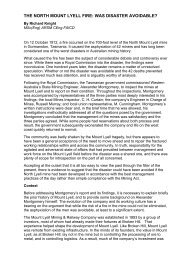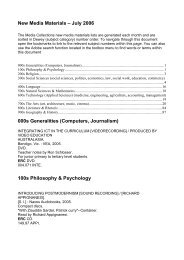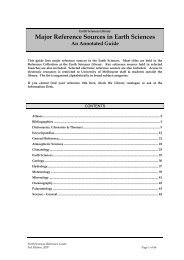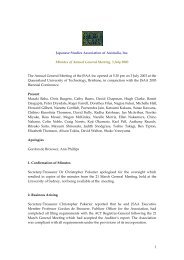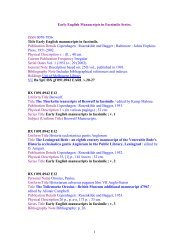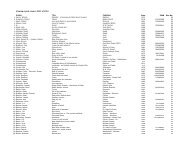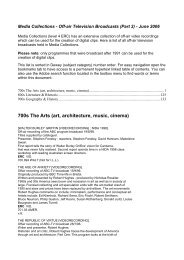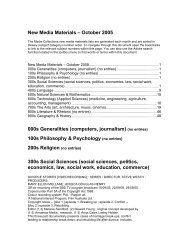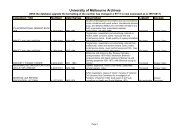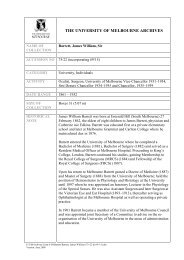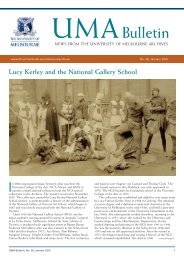Media Collections - Off-air Television Broadcasts (Part 1) - Library ...
Media Collections - Off-air Television Broadcasts (Part 1) - Library ...
Media Collections - Off-air Television Broadcasts (Part 1) - Library ...
Create successful ePaper yourself
Turn your PDF publications into a flip-book with our unique Google optimized e-Paper software.
SMITH.<br />
<strong>Off</strong>-<strong>air</strong> recording of the SBS programme broadcast 13/12/05, 14/12/05, 15/12/05.<br />
Copied under <strong>Part</strong> 5A of the Copyright Act 1968.<br />
Colour recording system: PAL ; Regional all.<br />
Copyright notice: Commonwealth of Australia. Copyright Regulations. 1969.<br />
Warning.<br />
[disc 1] pt. 1. jihad.com ; pt. 2. The Drug dealer, the estate agent & the<br />
telephone man / produced & directed by Roger Corke-- [disc 2] pt. 3. Frontline<br />
Pakistan / producer, Graham Cooper.<br />
Reporter, Peter Taylor.<br />
This three-part series features Peter Taylor's investigation into the new Al-<br />
Qaeda and the threat it poses the world. It is a challenge to the previous<br />
series, The power of nightmares, which presents the view that the threat from Al<br />
-Qaeda is a nightmare, dreamt up by politicians to hold the electorates in their<br />
thrall. Peter Taylor's present reports for the programme suggest a contrary<br />
view. One year in the making, the series was filmed in America, Europe, Africa<br />
and Asia. Includes interviews with, amongst others, Michael Scheuer, former<br />
head, CIA Bin Laden Unit, for comments and his expertise on the subject.<br />
Includes also reconstructions, as well as, selected newsreel and archival<br />
footage of events relating to the stories in the series.<br />
<strong>Part</strong> one examines how the threat from Al-Qaeda is facilitated by the internet.<br />
Al-Qaeda, once an organisation with a fixed structure, has become a loose<br />
network of groups, linked by the internet and dedicated to holy war. Through the<br />
internet, Al-Qaeda has become a global brand, using websites and email as its<br />
most powerful resource, enabling it to recruit, train, fundraise and mobilise.<br />
Includes interviews with Mohammed Al-Massari who runs a website from his home in<br />
London. Amongst the material from Iraq on his website, is video footage of three<br />
British soldiers being killed by a suicide bomber, the beheading of an American<br />
hostage and a manual with information on weaponry. Looks at the war being waged<br />
against cyberterrorism by British and American security agencies, including also<br />
an interview with an American magistrate, Shannen Rossmiller. By passing<br />
herself off as an Islamic radical on the internet, Rossmiller is responsible for<br />
the life sentencing of an American soldier prepared to pass information on to Al<br />
-Qaeda.<br />
<strong>Part</strong> two investigates the March 2004 Madrid train bombings, which killed 191<br />
people. One of the most devastating terrorist attacks ever carried out in Europe,<br />
it was the work of the new Al-Qaeda, locally recruited and acting independently<br />
of Osama bin Laden. Looks, also, at how the new Al-Qaeda recruits criminals,<br />
such as drug dealers, into its cells. These men are chosen because they know how<br />
to organise criminal activity and avoid the police. Many of them are 'takfiris',<br />
whose interpretation of Islam is so extreme that they consider any non-believer<br />
as infidels. They are Muslims who embrace a Western lifestyle, blending in<br />
easily, thus escaping detection by intelligence agencies. Two of the three key<br />
members of the Madrid cell - a drug dealer, an estate agent and a 'telephone<br />
man' - were takfiris. Features interviews with, for the first time, all the key<br />
figures hunting both the Madrid bombers, and those behind the Casablanca<br />
bombings. These two events were directly linked.<br />
<strong>Part</strong> three examines how Pakistani authorities, caught between American pressure<br />
and Islamic opposition, are involved in the struggle against the new Al-Qaeda.<br />
Pakistan has been at the centre of both the activities of Al-Qaeda and the<br />
struggle against it. Thousands of soldiers have been deployed in the remote<br />
mountain borders with Afghanistan, while the country's security services are<br />
trawling for intelligence in the cities. Pakistan has captured more Al-Qaeda<br />
suspects, including some of its most senior leaders, than any other country. The<br />
head of the country's Counter-Terrorism Centre, set up immediately after<br />
September 11, speaks for the first time about the interrogations of more than<br />
500 suspects, including the man he describes as the third most important Al-<br />
Qaeda figure. The Centre holds the world's largest Al-Qaeda database. Includes<br />
interviews with President Musharraf, who defends his country's record against<br />
allegations that the intelligence agencies helped establish the Taliban and have



